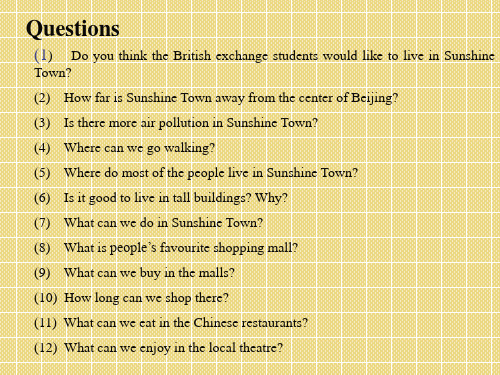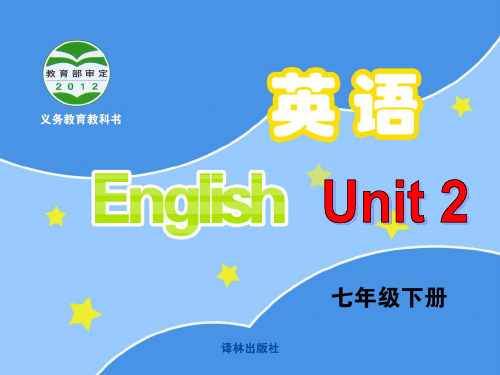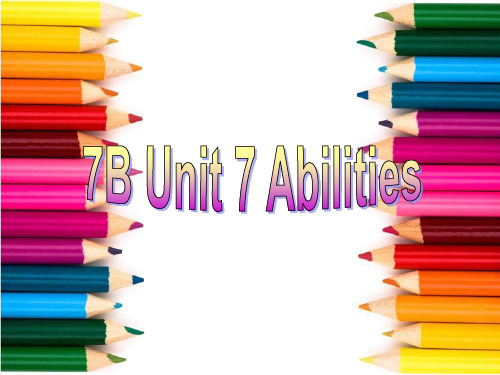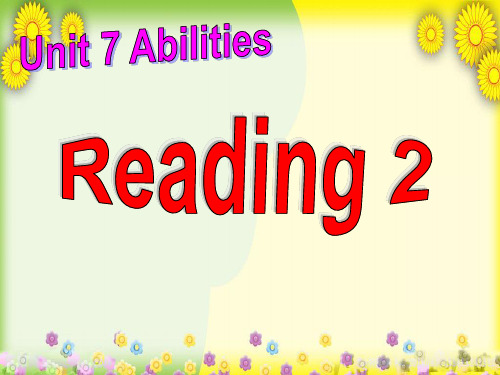新版牛津译林英语七年级下册7BUnit2ReadingI.ppt
合集下载
2023~2024 学年 Unit 2 Reading(19页)英语牛津译林版七年级下册课件

T
2、Usually there is a meeting at the weekend.
T
3、Simon wants to ask someone to fix his bcd Amy's notes and write a T if a sentence is true or an F if it is false.
3. What do the volunteers do there? They share different skills and help us with all kinds of problems.
Read the conversation and answer the questions.
4. What’s Simon’s problem? There’s something wrong with his computer.
5. What’s Annie’s problem? Her bicycle is broken.
6.What’s the relationship between Simon and Annie? Annie is Simon’s cousin.
S2: Hi, I’m a doctor. I can… Simon: I’m very lucky to have a community centre like that.
As middle school students, what can we do to help our neighbours?
Read the conversation and answer the questions.
1. What is Simon’s neighbours like? They’re kind and helpful.
英语:Unit 2 Reading II课件(译林牛津版七年级下)(PPT)5-4

Most students in our class do well in English.
我们班大多数人英语学得好. )
在森林中砍伐树木,采集木材:~林木。 【采访】动搜集寻访;调查访问:~新闻|加强图书~工作|记者来~劳动模范。 【采风】∥动搜集民歌。 【采购】 ①动选择购买(多指为机关或企业):~员|~建筑材料。②名担任采购工作的人:他在食堂当~。 【采光】动通过设计门窗的大小和建筑物的结构,使建
筑物内部得到适宜的自然;高三辅导https:/// ;光照。 【采集】动收集;搜罗:~标本|~民间歌谣。 【采景】动为摄影或写生寻找、选择 景物。 【采掘】动挖取;开采(矿物):~金矿|加快~进度。 【采矿】∥动把地壳中的矿物开采出来。有露天采矿和地下采矿两类。 【采莲船】名见页 〖跑旱船〗。 【采录】动①采集并记录:~民歌。②采访并录制:电视台~了新年晚会节目。 【采买】动选择购买(物品)。 【采纳】动接受(意见、建
( most还可以作形容词,在句中作定语,修饰名词,“最大的; 最多的;大多数的”。例如: Who do you think will get (the)most votes?你认为谁会得票最多?
Peter made thass.
彼得的错误是全班最多的。
议、要求):~群众意见。 【采暖】动通过设计建筑物的防寒取暖装置,使建筑物内部得到适宜的取暖温度。 【采取】动①选择施行(某种方针、政策、措
施、手段、形式、态度等):~守势|~紧急措施。②取:~指纹。 【采认】动承认:~学历。 【采收】动采摘收获;采集收取。 【采撷】〈书〉动①采 摘:~野果。②采集。 【采写】动采访并写出:好人好事,要及时~,及时报道。 【采血】∥动为检验等目的,从人和动物的血管采取血液。 【采信】动相 信(某种事实)并用来作为处置的依据:被告的陈述证据不足,法庭不予~。 【采样】动采集样品;取样:食品~检查。 【采用】动认为合适而使用:~新 工艺|~举手表决方式|那篇稿子已被编辑部~。 【采油】∥动开采地下的石油。 【采择】动选取;选择:提出几种方案,以供~。 【采摘】动摘取(花儿、 叶子、果子):~葡萄|~棉花。 【采制】动①采集加工:~春茶。②采访并录制:~电视新闻。 【采种】∥动采集植物的种子。 彩(②綵)①颜色: 五~|~云。②彩色的丝绸:剪~|张灯结~。③称赞夸奖的欢呼声:喝~|博得满堂~。④花样;精彩的成分:丰富多~。⑤名或某种游戏中给得胜者的 东西:得~|中~|~票。⑥戏曲里表示特殊情景时所用的技术;魔术里用的手法:火~|带~|~活。⑦指负伤流的血:挂~|~号。⑧()名姓。 【彩
我们班大多数人英语学得好. )
在森林中砍伐树木,采集木材:~林木。 【采访】动搜集寻访;调查访问:~新闻|加强图书~工作|记者来~劳动模范。 【采风】∥动搜集民歌。 【采购】 ①动选择购买(多指为机关或企业):~员|~建筑材料。②名担任采购工作的人:他在食堂当~。 【采光】动通过设计门窗的大小和建筑物的结构,使建
筑物内部得到适宜的自然;高三辅导https:/// ;光照。 【采集】动收集;搜罗:~标本|~民间歌谣。 【采景】动为摄影或写生寻找、选择 景物。 【采掘】动挖取;开采(矿物):~金矿|加快~进度。 【采矿】∥动把地壳中的矿物开采出来。有露天采矿和地下采矿两类。 【采莲船】名见页 〖跑旱船〗。 【采录】动①采集并记录:~民歌。②采访并录制:电视台~了新年晚会节目。 【采买】动选择购买(物品)。 【采纳】动接受(意见、建
( most还可以作形容词,在句中作定语,修饰名词,“最大的; 最多的;大多数的”。例如: Who do you think will get (the)most votes?你认为谁会得票最多?
Peter made thass.
彼得的错误是全班最多的。
议、要求):~群众意见。 【采暖】动通过设计建筑物的防寒取暖装置,使建筑物内部得到适宜的取暖温度。 【采取】动①选择施行(某种方针、政策、措
施、手段、形式、态度等):~守势|~紧急措施。②取:~指纹。 【采认】动承认:~学历。 【采收】动采摘收获;采集收取。 【采撷】〈书〉动①采 摘:~野果。②采集。 【采写】动采访并写出:好人好事,要及时~,及时报道。 【采血】∥动为检验等目的,从人和动物的血管采取血液。 【采信】动相 信(某种事实)并用来作为处置的依据:被告的陈述证据不足,法庭不予~。 【采样】动采集样品;取样:食品~检查。 【采用】动认为合适而使用:~新 工艺|~举手表决方式|那篇稿子已被编辑部~。 【采油】∥动开采地下的石油。 【采择】动选取;选择:提出几种方案,以供~。 【采摘】动摘取(花儿、 叶子、果子):~葡萄|~棉花。 【采制】动①采集加工:~春茶。②采访并录制:~电视新闻。 【采种】∥动采集植物的种子。 彩(②綵)①颜色: 五~|~云。②彩色的丝绸:剪~|张灯结~。③称赞夸奖的欢呼声:喝~|博得满堂~。④花样;精彩的成分:丰富多~。⑤名或某种游戏中给得胜者的 东西:得~|中~|~票。⑥戏曲里表示特殊情景时所用的技术;魔术里用的手法:火~|带~|~活。⑦指负伤流的血:挂~|~号。⑧()名姓。 【彩
译林牛津版七年级下Unit2Reading II课件(共25张PPT)

1. My neighbours are kind and helpful.
help + ful helpful
care + ful careful
wonder + ful
wonderful
2. … help us with all kinds of problems. (1) help sb. do sth. 帮助某人做某事
e.g. Are you ready to help the old people do some shopping?
I. 用括号内所给单词适当形式填空。
1. She is _h_e_l_p_fu__l (help). She often _h_e_lp__s_ (help) us with difficult problems.
C. Wha good teacher. He
always helps us ______ English.
A. in
B. with
C. at
D. for
3. — Is ________ anything wrong _____ your mobile phone?
改写同义句。 My computer doesn’t work. There be something wrong with my computer.
4. She’s going to ask someone to fix it.
(1) ask sb. to do sth. “叫某人做某事” e.g. Simon asks me to help him check his computer.
e.g. I sometimes help my mother clean the room.
牛津译林版七年级下册英语课件:7bunit2neighboursreading1

college student The _______ is helping the boy with his homework.
fixing the The man is ______ girl’s bicycle ________.
engineer is The ________ checking the computer _________.
1. Volunteers share their skills and help people in the neighbourhood with different problems. 2. Usually there is a meeting at the weekend.
3. Simon wants to ask someone to fix computer his bicycle. 4. Annie’s bicycle computer is broken. College help their 5. Parents the children with students their homework. 6. Volunteers also help the old people.
• Students can get help with their __________. homework There are some college students among the volunteers, and they are always ready to help __________. Volunteers also help lucky the old people. We are __________ to live in a neighbourhood like that. People here are like a big family.
牛津译林版七年级下册课件:7BU7AbilitiesReadingII共27张

3. 一位80岁的老人住在隔壁。 A 80-year-old man lives next door.
4. 他冲进屋子去救一个女孩。 He rushed into the house to save a girl.
5. 我弟弟弄伤了自己的腿。 My brother hurt his own legs.
10. …but I didn’t have time to think about it. have time to do sth. 有时间做某事 e.g. I have time to do my homework. 我有时间做我的家庭作业。
11. We should be careful with it. careful adj. 仔细的, 认真的; 小心的 be careful with … 小心 …… e.g. We must be careful with fire. 我们必须要小心火。
e.g. He is at home alone/by himself/on his own. 他独自一个人在家。
3. Suddenly, he heard someone shouting … hear/see sb. doing sth. 听到/看到某人正在做某事 e.g. He heard someone singing next door. 他听到有人在隔壁唱歌。
6. Be careful with _m_a_t_c_h_e_s (match).
II. Translate the following sentences. 1. 我们应当互相帮助,互相学习。
We should help and study with each other. 2. 汤姆是个勇敢的男孩, 他把他的朋友 从火中救出来了。 Tom is a brave boy. He saved his friend from the fire.
牛津译林初中英语七下Unit 7 Abilities reading 2》课件

五问五学,浅问深学—— 概问引标,课前先学
Phrases in the text.
1. 从……中救出来 2. 独自在家 3. 隔壁 4. 在那个时候 5. 扑灭火
save … from … be at home alone next door at that moment put out the fire
He was at home _a_lo_n_e_.
do saved his neighbour _fr_o_m__ a fire.
feel was not _a_fr_a_i_d_.
Mrs could not _g_e_t_o_u_t__ because Sun she _h_u_r_t_ her leg.
He found her there and she couldn’t g_et__ out because she h_u_r_t_ her leg. Liu Tao p_o_u_r_e_d_ r over his clothes and r_u_sh__ed__ into the kitchen to save her.
5. a 79-year-old man 一位79岁的老人
e.g. He is a 79-year-old man.
= The man is 79 years old. 他是一位79岁的老人。
6. pour … over… 把……倾倒……
e.g. He poured milk over his shirt. 他把牛奶倾倒在他的衬衫上。
On 10th May
Liu Tao Mrs Sun
_2_5__ years old a _7_9_-_y_ea_r_-_o_l_d_ woman
Where
Phrases in the text.
1. 从……中救出来 2. 独自在家 3. 隔壁 4. 在那个时候 5. 扑灭火
save … from … be at home alone next door at that moment put out the fire
He was at home _a_lo_n_e_.
do saved his neighbour _fr_o_m__ a fire.
feel was not _a_fr_a_i_d_.
Mrs could not _g_e_t_o_u_t__ because Sun she _h_u_r_t_ her leg.
He found her there and she couldn’t g_et__ out because she h_u_r_t_ her leg. Liu Tao p_o_u_r_e_d_ r over his clothes and r_u_sh__ed__ into the kitchen to save her.
5. a 79-year-old man 一位79岁的老人
e.g. He is a 79-year-old man.
= The man is 79 years old. 他是一位79岁的老人。
6. pour … over… 把……倾倒……
e.g. He poured milk over his shirt. 他把牛奶倾倒在他的衬衫上。
On 10th May
Liu Tao Mrs Sun
_2_5__ years old a _7_9_-_y_ea_r_-_o_l_d_ woman
Where
Unit2-Reading1课件牛津译林版英语七年级下册
What do people do at the community centre
ask a computer engineer to check the computer
help you with your homework
fix the broken bicycle
visit the old people
kind
helpful
Let's think
They usually meet ____a_t__th_e__w_e_e_k_e_n_d_________. They usually have __a_“_h_e_l_p_i_n_g_h_a_n_d__s”__m_e_e_t_in__g___.
Let's think
B: Sorry. You can ask … to …. … is good at …. A: Thank you all the same.
Let's conclude Neighbours are important to us. We should help each other.
Homework:
There is something wrong with …. … is broken. … doesn’t work. … need help. The road is not clean.
Let's talk
Dialogue 1
A: Excuse me! There’s something wrong with ….
1. Volunteers share their skills and help people in the neighbourhood with different problems.
ask a computer engineer to check the computer
help you with your homework
fix the broken bicycle
visit the old people
kind
helpful
Let's think
They usually meet ____a_t__th_e__w_e_e_k_e_n_d_________. They usually have __a_“_h_e_l_p_i_n_g_h_a_n_d__s”__m_e_e_t_in__g___.
Let's think
B: Sorry. You can ask … to …. … is good at …. A: Thank you all the same.
Let's conclude Neighbours are important to us. We should help each other.
Homework:
There is something wrong with …. … is broken. … doesn’t work. … need help. The road is not clean.
Let's talk
Dialogue 1
A: Excuse me! There’s something wrong with ….
1. Volunteers share their skills and help people in the neighbourhood with different problems.
2021年牛津译林版初中英语七年级下册第七单元第2课时教学PPT课件
考向 hurt还可作动词,意为“(使)疼痛;受伤;使 不快;使烦恼;感到疼痛”,其过去式为hurt。
eg:Look out!The knife may hurt you. 小心!那刀可能会伤到你。 What she said hurt my feelings deeply. 她的话深深地伤害了我的感情。 My back hurts. 我的后背疼。
知识讲解
知识点 1 save /seɪv/ vt. 救;救助 eg:The young man saved her life. 这个年轻人救了她的命。
考向一 save常用短语:save...from...“从……中救 出……”;save sb.“救某人”;save one's life“救某人的命”。
The fire burnt Lin Tao's arms, neck and face. He was in hospital for two weeks. Many people visited him and gave him flowers and presents. “How brave you are!” they said. “Were you afraid at that moment?” “Yes, a little,” Lin Tao nodded, “but I didn't have time to think about it. Mrs Sun needed my help.” “Fire is very dangerous. We should be careful with it,” he also said.
课堂练习
一、根据汉语提示完成句子 1. You are__b_r_a_v_e__(勇敢的) enough to accept(接受)such a
eg:Look out!The knife may hurt you. 小心!那刀可能会伤到你。 What she said hurt my feelings deeply. 她的话深深地伤害了我的感情。 My back hurts. 我的后背疼。
知识讲解
知识点 1 save /seɪv/ vt. 救;救助 eg:The young man saved her life. 这个年轻人救了她的命。
考向一 save常用短语:save...from...“从……中救 出……”;save sb.“救某人”;save one's life“救某人的命”。
The fire burnt Lin Tao's arms, neck and face. He was in hospital for two weeks. Many people visited him and gave him flowers and presents. “How brave you are!” they said. “Were you afraid at that moment?” “Yes, a little,” Lin Tao nodded, “but I didn't have time to think about it. Mrs Sun needed my help.” “Fire is very dangerous. We should be careful with it,” he also said.
课堂练习
一、根据汉语提示完成句子 1. You are__b_r_a_v_e__(勇敢的) enough to accept(接受)such a
牛津译林版英语7B七年级下册Unit2 Reading2课件
4. Jiangyin is __b_ea_u_t_if_u_l_. Many people come here every year to enjoy its __b_e_a_u_t_y__. (beauty/beautiful)
Who is my BIG neighbour?
Simon’s neighbours
share different skills
volunteers kind
helpful
do
some••
vddoo.-ssinoommgee
cooking washing
• do some reading
• do some shopping • …
• do some cleaning
help sb. with sth.
Choose the correct answers to complete the sentences.
1. My teachers are really __h_e_lp_f_u_l__. With their ___h_e_l_p___, I catch up with my classmates. (help/helpful)
There’s something wrong with his computer.
Something is wrong with his computer. His computer is broken.
Is there anything wrong with Annie’s computer? No. There isn’t anything wrong with her computer. There is nothing wrong with her computer./ Nothing is wrong with her computer.
Who is my BIG neighbour?
Simon’s neighbours
share different skills
volunteers kind
helpful
do
some••
vddoo.-ssinoommgee
cooking washing
• do some reading
• do some shopping • …
• do some cleaning
help sb. with sth.
Choose the correct answers to complete the sentences.
1. My teachers are really __h_e_lp_f_u_l__. With their ___h_e_l_p___, I catch up with my classmates. (help/helpful)
There’s something wrong with his computer.
Something is wrong with his computer. His computer is broken.
Is there anything wrong with Annie’s computer? No. There isn’t anything wrong with her computer. There is nothing wrong with her computer./ Nothing is wrong with her computer.
牛津译林英语七年级下册Unit 2 Reading II(共38张PPT)
(2) It is helpful sb. to do sth. It is helpful sb. to do sth.
for you to study by yourself at home. 有帮助的
of the volunteer taxi drivers to send patients
to hospital in time.
I need __h_e_l_p_w__it_h__ my schoolwork. (2) help sb. with sth. 在某方面帮助某人 v.
help sb. (to) do sth. 帮助某人做某事 我的老师们经常帮助我完成家庭作业。 My teachers often _h_e_l_p_m__e_w__it_h___my homework. My teachers often _h_e_l_p_m__e_t_o__d_o__ my homework.
1. What are your neighbours like?
你的邻居怎么样?(“人品、性格如何”)
eg. 询问天气:今天的天气如何? What’s the weather like today?
= How is the weather today?
eg. 询问外表/外观 What is sb/sth like? (问外表/个性)
(1) A is helpful to B.
The volunteers are helpful to the patients in Wuhan.
乐于助人的
A mask (口罩) is helpful to me when I have to go out.
有帮助的
★ 乐于助人的/有帮助的
for you to study by yourself at home. 有帮助的
of the volunteer taxi drivers to send patients
to hospital in time.
I need __h_e_l_p_w__it_h__ my schoolwork. (2) help sb. with sth. 在某方面帮助某人 v.
help sb. (to) do sth. 帮助某人做某事 我的老师们经常帮助我完成家庭作业。 My teachers often _h_e_l_p_m__e_w__it_h___my homework. My teachers often _h_e_l_p_m__e_t_o__d_o__ my homework.
1. What are your neighbours like?
你的邻居怎么样?(“人品、性格如何”)
eg. 询问天气:今天的天气如何? What’s the weather like today?
= How is the weather today?
eg. 询问外表/外观 What is sb/sth like? (问外表/个性)
(1) A is helpful to B.
The volunteers are helpful to the patients in Wuhan.
乐于助人的
A mask (口罩) is helpful to me when I have to go out.
有帮助的
★ 乐于助人的/有帮助的
